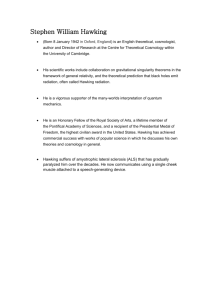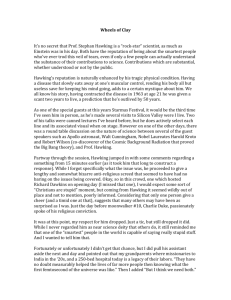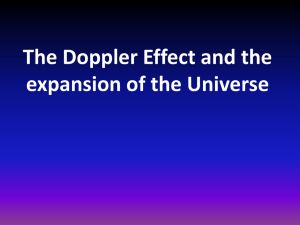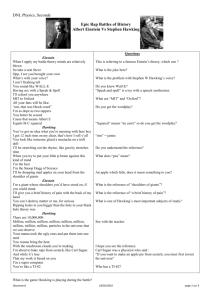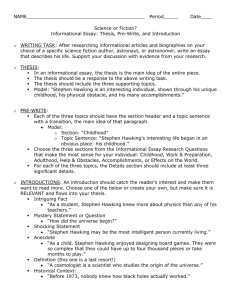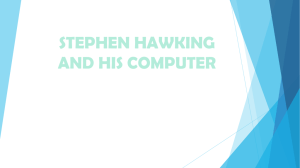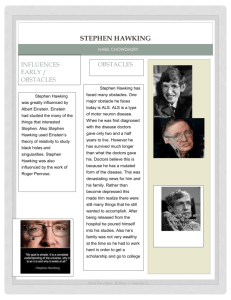Stephen Hawking Stephen Hawking Offers New Theory on Black
advertisement
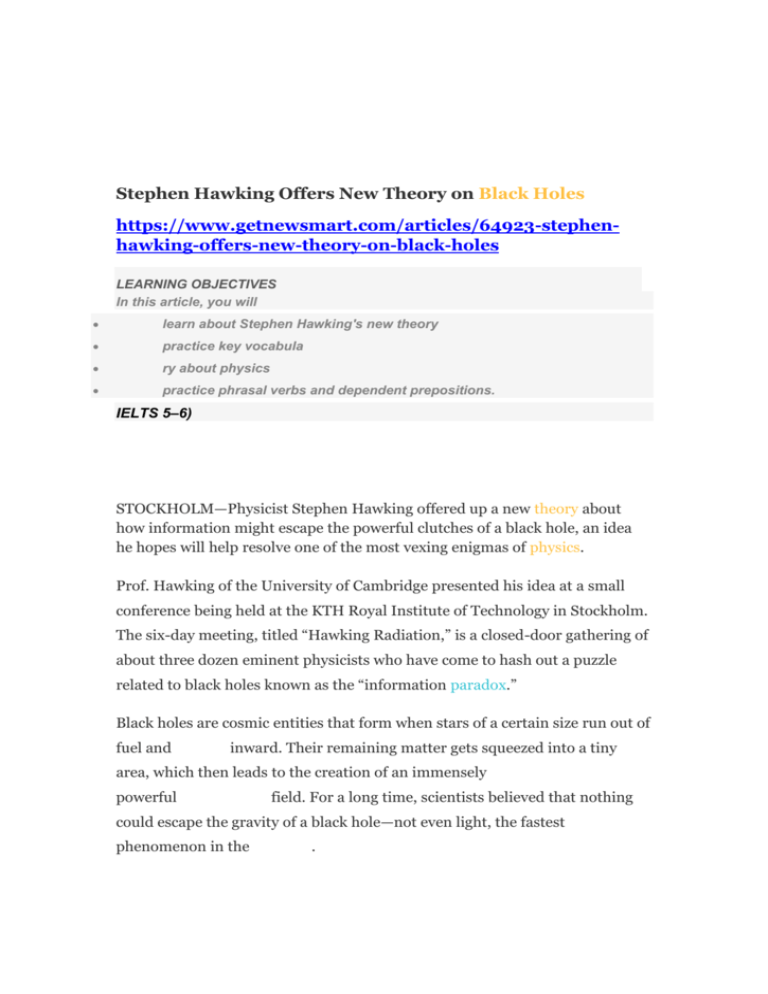
Stephen Hawking Stephen Hawking Offers New Theory on Black Holes https://www.getnewsmart.com/articles/64923-stephenhawking-offers-new-theory-on-black-holes LEARNING OBJECTIVES In this article, you will learn about Stephen Hawking's new theory practice key vocabula ry about physics practice phrasal verbs and dependent prepositions. IELTS 5–6) STOCKHOLM—Physicist Stephen Hawking offered up a new theory about how information might escape the powerful clutches of a black hole, an idea he hopes will help resolve one of the most vexing enigmas of physics. Prof. Hawking of the University of Cambridge presented his idea at a small conference being held at the KTH Royal Institute of Technology in Stockholm. The six-day meeting, titled “Hawking Radiation,” is a closed-door gathering of about three dozen eminent physicists who have come to hash out a puzzle related to black holes known as the “information paradox.” Black holes are cosmic entities that form when stars of a certain size run out of fuel andcollapse inward. Their remaining matter gets squeezed into a tiny area, which then leads to the creation of an immensely powerful gravitational field. For a long time, scientists believed that nothing could escape the gravity of a black hole—not even light, the fastest phenomenon in the universe. In 1974, Prof. Hawking famously described how black holes—contrary to expectations—wouldemit radiation. Most physicists today believe that idea is correct and have dubbed it “Hawking radiation.” However, Prof. Hawking’s research also indicated that a black hole that emits radiation will eventually evaporate and all the information about every particle it has ever swallowed should disappear for good. There lies the source of the enigma. Quantum mechanics—a highly successful theory that describes physical phenomena at the scale of atoms and subatomic particles—says that information can never be lost, even when it falls into a black hole. It is widely believed to be an inviolable law of nature. How to get around this so-called information paradox? Some physicists suggested that perhaps information did somehow escape a black hole. Prof. Hawking vociferously maintained that this could never happen. Then, some three decades later, he presented calculations that showed how information could leak out of a black hole, after all. The challenge has been to figure out how that might happen. On Monday night, Prof. Hawking delivered a talk about black holes for a lay audience in Stockholm. At the end of his sold-out lecture, which was attended by about 3,000 people, Prof. Hawking couldn’t resist throwing out a teaser. “I have now discovered how information is returned from black holes,” Prof. Hawking said from the dimly lit stage, as a strong spotlight lit up his small, wheelchair-bound frame. “I will talk about it at the conference tomorrow.” At KTH today, Prof. Hawking made good on his promise. In a highly technical presentation delivered to fellow physicists and a handful of other observers, he concluded: “I propose that the information is stored not in the interior of the black hole as one might expect, but in its boundary, the event horizon.” Prof. Hawking, 73 years old, had originally suggested that even though a black hole leaks out radiation, that radiation doesn’t carry any information about the material swallowed up inside it. His new idea is that everything that falls in affects the way the Hawking radiationcomes out. So information about what gets sucked in is really stored in the Hawking radiation after all. It is thus not lost and quantum mechanics’ crucial tenet isn’t violated. Physicists at the conference, which was co-organized by the University of North Carolina at Chapel Hill and the Nordic Institute for Theoretical Physics in Stockholm, said it was an interesting theory but needed to be fleshed out further. “I wouldn’t say the solution to the information paradox has been found because there are several competing ideas,” said Carlo Rovelli, physicist at the Aix-Marseille Universite in France and one of the attendees. “But Stephen being Stephen, everybody’s going to take it seriously.” Prof. Hawking’s theory, if fact, echoes one posed by Gerard ‘t Hooft of Utrecht University and winner of the 1999 Nobel Prize in Physics. Prof. ‘t Hooft published his idea in 1996 but he says it was buried in a long article and didn’t cause much of a stir. In that article, “I said that Hawking radiation does carry information out of the black hole,” said Prof. ‘t Hooft, who was also present at the conference. But, he added, the 1996 approach didn’t seem too promising “because I made some assumptions and my calculations showed that I get too much information” escaping from the black hole. Prof. ‘t Hooft said it wasn’t clear whether Prof. Hawking’s version of the same theory would go much further. “I claim he is now where I was 20 years ago,” he said. “If he announces this as a new idea, I won’t be thrilled.”
